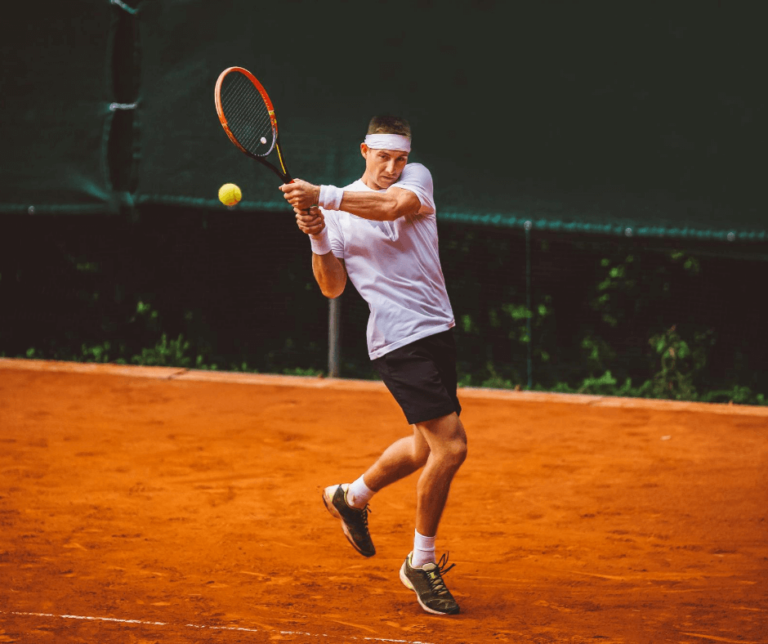
Maria Lindström har hjälpt över 1000 människor med att få till de förändringar de vill ha. Maria jobbar med elitidrottare men även som livscoach. Maria har varit professionell tennisspelare och deltagit i Olympiska spelen.

Simplify – fewer technically thoughts
There is a massive emphasis on technical and physical details within the tennis world. More ultra slow motion videos. More fb groups. More devices. More programs. More courses to subscribe to. In the tennis world, we are constantly being bombarded with more and more specialized tips and tricks to become better.
Taking the racket back in time isn’t enough. We want a slow motion video showing us every little intricate detail how Federer does it – and then trying to do the same yourself.
Just hitting balls isn’t enough. We want a special gadget that helps us bend the legs in the right way.
Playing a practice match isn’t enough. We want the heart rate to be monitored at the same time as we look at the statistics that show how many percent we have hit wide, short, to the backhand or forehand.
It might sound a little exaggerated for some of you, but you get the point: It is too much focus on the technical details – so much that after a while it becomes – complicated.
Yes, it can be highly valuable to find some simple technical tools so you have a good sound base for your technique, but often we get overwhelmed with too many tips and it feels anything but simple.
I’ve an opposite solution: Have less emphasis on the technique and more focus on solving the problem of getting the ball in the court. Simplify.
Fewer thoughts about what to change technically, means more freedom to explore other things like for instance the mental part of the game.
Less time thinking of what technical mistakes you are making, more time developing a better mindset.
Often coaches, commentators and parantes talk about “mental toughness” – like it is something you have a gene for, an ability you either have or you don´t. The number of people that actually have the understanding and the willingness to train their mindset, are few. I get it – it is easier to watch a slow motion video on how to change the technical part, or train your leg muscles more. It is tangible and you can measure it more easily. Starting to train your mindset is difficult because it requires a different focus and for most people – it is outside their comfort zone.
That is a dimension that is relatively unutilized, but acquiring a training routine isn’t too difficult, and in my opinion – offers the fastest and deepest changes to your results and also enables you to play close to your potential.
What dimension? Mindset training.
Ok, I know it is not a new area to you but most people just talk about it and never do anything. You understand it could be good for you, but seldom dedicated your efforts to any mindset tools.
Too nervous when it really counts or not enough pace at the ball because your muscles don’t obey you. Most often you feel like you have so much more to give – but it never shows up when you compete.
Before I address this problem I see in many pro athletes careers, the amount of elite athletes not living up to their potential – because they have a poor mindset – is staggeringly high. But since more often than not, you believe there is no real good solution, your problem lingers.
The effort of starting something new that is not as tangible hinders many from taking an action, they keep doing more of the same, wish is more physical and technical practices. This will of course make you better but it will most likely leave that last hurdle on the ground.
The key to finding a more tough mental approach while competing is not necessarily more of the same – technique or physical tips. The biggest difference will come from mindset tools, and when you know how to apply them during competition.
The basis of my program is you implementing something new into your already good sport system. The integration of the tools is the most important part, so you feel confident you can tackle any situation on the field. If you get in a tough situation you know what tool to use. Crushingly simple.
Pro tennis gave me valuable experiences to try different mindset tools – as well as coaching 1000 of people over the last 15 years – and I developed a program that helps elite athletes to reach all the way to their highest potential.
Some changes my students have experienced as a result of their effort: They are starting to focus better. Becomes more confident even in tough situations. They reflect more on their own mindset and behaviour, and that makes the jump to better results faster. They get better at handling their nervousness.
Mindset practice is the quickest way for most athletes to get better results, but do you think most athletes use them? I do not think so.
Why are you as an elite athlete not so interested in this? At times we are so hooked to our old ways of doing things that we discard newness, the uncertainty scares us. You might even have to let go of some ideas that you have about mindset training, like it is something “wrong” with you.
Perhaps you already know that your inner dialog needs to be better out on the field, and you might even have tried it a few times, but not being frequent enough. To change this consistently can be the biggest change you have ever done to your career, but you have to take the leap and decide that it is important.
What is the starting point? Find out when you are lacking confidence the most. Get more clarity. Then start using one or two tools consciously, it could be as simple as being a little more positive. Do it during 2 weeks, and you will soon get better energy in your body.
There are all kinds of mindset tools you can find out on the internet, just stick with one or two for a couple of weeks.
There are a few myths around mindset tools for elite athletes, and I am sure you have heard some of them. If you get physical fit you automatically get good mentally – is false – it is not always the case. It is something wrong with me if I need to work on my mindset. I will get my confidence when I start to win – but what happens before you win? These myths can be excuses of making no change.
My experience in my own pro career and with students that I coach is that mindset and mental toughness is a fun part to train because, if it is done the right way, it is very rewarding. It is one part of a whole, in becoming a great athlete. More clarity about what to focus on truly makes you more confident that you can up your game.
You as a sports person make choices every day on what, if anything, is important to implement to further your career. Your effort to include mindset in your training will change the energy on and of the sports field in a great way. That is my promise.
